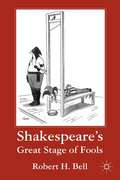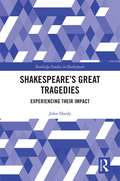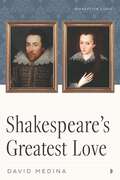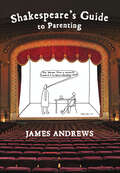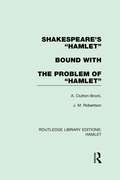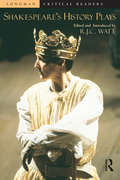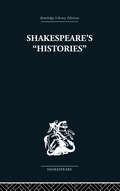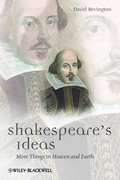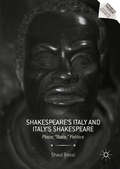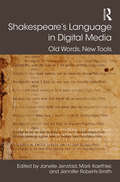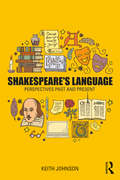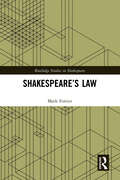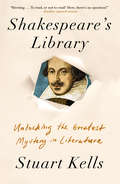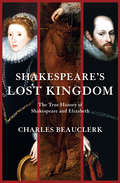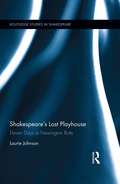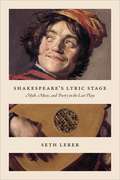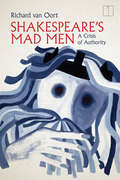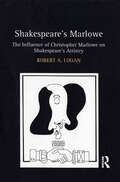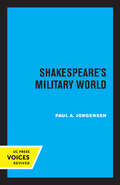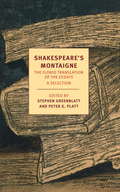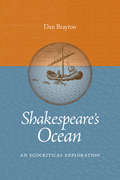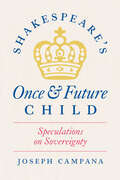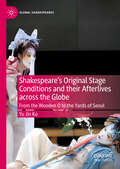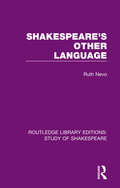- Table View
- List View
Shakespeare's Great Stage of Fools
by Robert H. BellThis lively, lucid book undertakes a detailed and provocative study of Shakespeare's fascination with clowns, fools, and fooling. Through close reading of plays over the whole course of Shakespeare's theatrical career, Bell highlights the fun, wit, insights, and mysteries of some of Shakespeare's most vibrant and often vexing figures.
Shakespeare's Great Tragedies: Experiencing Their Impact (Routledge Studies in Shakespeare)
by John HardyShakespeare's great tragedies portray through their richly imagined worlds the inescapable fact of human mortality. As the work of a great creative genius, they are so diverse that critical formulas used to describe their overall impact tend to be somewhat suspect. Their impact follows from a response to the entire dramatic action, what is felt at the end with the weight or experience of the whole play behind it. It draws on how our feelings and judgement are exercised and engaged throughout the drama. Shakespeare portrays what life can be like, without pandering to the wish for something easier to contemplate. Something more invigorating than consolation is provided, such art at its greatest achieving the strength of truth. What it compels is a complex acceptance, reflected in Edgar's words, "The weight of this sad time we must obey". Not only implicit positives give value to these plays. Their significance finally results from what they imaginatively invite their audience to experience and witness. This gives a sense not only of the value of life, but also of what can threaten it.
Shakespeare's Greatest Love (Disruption Curios)
by David MedinaRelying on historical and literary evidence hidden in plain sight, Shakespeare's Greatest Love tells the true, uncensored love story of William Shakespeare and Henry Wriothesley, 3rd Earl of Southampton."Shall I compare thee to a summer's day? Thou art more lovely and more temperate." —Shakespeare's Sonnet 18, written for and about Southampton. Leaving behind a wife and three young children in Stratford-upon-Avon, Shakespeare moved to London for its thrilling theater scene, where everyone mixed freely across ages, classes, and ranks. It was through their mutual passion for the theater that the handsome twenty-seven-year-old playwright first met and fell deeply in love with the effeminate seventeen-year-old earl who beguiled men and women alike and avowed that 'desire and pleasure [should] sometimes triumph over reason.' Author David Medina demonstrates that Shakespeare wrote more of his plays and poems for and about Southampton than anyone else—works that are sexually charged, romantic, and homoerotic. He also chronicles the evidence that Southampton provided Shakespeare the support he needed to secure his acting company share, coat of arms, family residence, royal commission, life portrait, and funerary bust. Shakespeare and Southampton's personal and professional relationship evolved privately and publicly over a quarter century against the backdrop of a national anti-sodomy law, multiple plague outbreaks, unexpected pregnancies, rushed and possibly forced marriages, a failed rebellion, and political imprisonments. Shakespeare's Greatest Love challenges us all to recognize Southampton as the individual who had the most significant impact on Shakespeare's life, literature, and legacy.
Shakespeare's Guide to Parenting
by James AndrewsTrust father of three William Shakespeare for all the advice you need for any parenting dilemma, in this witty and erudite guide—a handy collection of wisdom drawn from his most beloved works, from Hamlet to King Lear to Much Ado About Nothing.With a series of cunningly extracted lines from his best-loved plays and sonnets, hilariously illustrated in a simple, almost child-like style, James Andrews proves once again that Shakespeare—expert on love, death, vanity, ambition, war, deceit, regret—is the font of all wisdom, including raising children.Your thirsty toddler wakes you up at 3 a.m. Shakespeare describes your thoughts perfectly:What cursed foot wanders this way tonight? (Romeo and Juliet)Your child throws a temper tantrum, clinging to your legs. Shakespeare has the perfect response:Vile thing, let loose, or I will shake thee from me like a serpent. (A Midsummer Night’s Dream)Your son throws a booze party, crashes the car, or commits some other vaguely humiliating infraction or minor illegal act. Shakespeare feels your pain:Good wombs have borne bad sons. (The Tempest)And for your fussy, ungrateful eater? Shakespeare has an answer:I’ll make you feed on berries and on roots, and feed on curds and whey, and suck the goat! (Titus Andronicus)Organized by periods of parenting hell—from the newborn nightmares to the teenage trials—Shakespeare’s Guide to Parenting is the perfect gift book for every literary parent or parent to be. If you want the last word with your children, nothing beats a quote from Shakespeare.
Shakespeare's Hamlet bound with The Problem of Hamlet (Routledge Library Editions: Hamlet)
by A. Clutton-Brock J. M. RobertsonThis volume combines two classic works on Hamlet, first published in 1919 and 1922. The first book's original description says that it contains a theory which attempts to explain an everlasting problem - it insists that Hamlet is neither a failure not an accident, but a very great work of art. In a final chapter, the play is examined as an aesthetic document. It is a profoundly interesting and not unprovocative work. The second book reviews and attempts to resolve the most interesting debate of any Shakespeare play and presents proper method for investigating the genesis of the plays in this way.
Shakespeare's History Plays (Longman Critical Readers)
by Robert WattShakespeare's history plays are central to his dramatic achievement. In recent years they have become more widely studied than ever, stimulating intensely contested interpretations, due to their relevance to central contemporary issues such as English, national identities and gender roles. Interpretations of the history plays have been transformed since the 1980s by new theoretically-informed critical approaches. Movements such as New Historicism and cultural materialism, as well as psychoanalytical and post-colonial approaches, have swept away the humanist consensus of the mid-twentieth century with its largely conservative view of the plays. The last decade has seen an emergence of feminist and gender-based readings of plays which were once thought overwhelmingly masculine in their concerns. This book provides an up-to-date critical anthology representing the best work from each of the modern theoretical perspectives. The introduction outlines the changing debate in an area which is now one of the liveliest in Shakespearean criticism.
Shakespeare's History: Mirrors of Elizabethan Policy.
by Lily B CampbellFirst published in 1947 in the USA. This edition reprints the first UK edition of 1964. Published to critical acclaim, the central argument of this book is that the historical play must be studied as a genre separate from tragedy and comedy. Just as there is in Shakespearean tragedies a dominant ethical pattern of passion opposed to reason, so there is in the history plays a dominant political pattern characteristic of the political philosophy of the age. From the 'troublesome reign' of King John to the 'tragical doings' of Richard III, Shakespeare wove the events of English history into plots of universal interest.
Shakespeare's Ideas: More Things in Heaven and Earth (Blackwell Great Minds #36)
by David BevingtonAn in-depth exploration, through his plays and poems, of the philosophy of Shakespeare as a great poet, a great dramatist and a "great mind". Written by a leading Shakespearean scholar Discusses an array of topics, including sex and gender, politics and political theory, writing and acting, religious controversy and issues of faith, skepticism and misanthropy, and closure Explores Shakespeare as a great poet, a great dramatist and a "great mind"
Shakespeare's Individualism
by Peter HolbrookProviding a provocative and original perspective on Shakespeare, Peter Holbrook argues that Shakespeare is an author friendly to such essentially modern and unruly notions as individuality, freedom, self-realization and authenticity. These expressive values vivify Shakespeare's own writing; they also form a continuous, and a central, part of the Shakespearean tradition. Engaging with the theme of the individual will in specific plays and poems, and examining a range of libertarian-minded scholarly and literary responses to Shakespeare over time, Shakespeare's Individualism advances the proposition that one of the key reasons for reading Shakespeare today is his commitment to individual liberty - even as we recognize that freedom is not just an indispensable ideal but also, potentially, a dangerous one. Engagingly written and jargon free, this book demonstrates that Shakespeare has important things to say about fundamental issues of human existence.
Shakespeare's Italy and Italy's Shakespeare
by Shaul BassiShaul Bassi is AssociateProfessor of English and Postcolonial Literature at Ca'Foscari University ofVenice, Italy. His publications include Visionsof Venice in Shakespeare, with Laura Tosi, and Experiences of Freedom in Postcolonial Literatures and Cultures, with Annalisa Oboe.
Shakespeare's Language in Digital Media: Old Words, New Tools (Digital Research in the Arts and Humanities)
by Janelle Jenstad Mark Kaethler Jennifer Roberts-SmithThe authors of this book ask how digital research tools are changing the ways in which practicing editors historicize Shakespeare's language. Scholars now encounter, interpret, and disseminate Shakespeare's language through an increasing variety of digital resources, including online editions such as the Internet Shakespeare Editions (ISE), searchable lexical corpora such as the Early English Books Online-Text Creation Partnership (EEBO-TCP) or the Lexicons of Early Modern English (LEME) collections, high-quality digital facsimiles such as the Folger Shakespeare Library's Digital Image Collection, text visualization tools such as Voyant, apps for reading and editing on mobile devices, and more. What new insights do these tools offer about the ways Shakespeare's words made meaning in their own time? What kinds of historical or historicizing arguments can digital editions make about Shakespeare's language? A growing body of work in the digital humanities allows textual critics to explore new approaches to editing in digital environments, and enables language historians to ask and answer new questions about Shakespeare's words. The authors in this unique book explicitly bring together the two fields of textual criticism and language history in an exploration of the ways in which new tools are expanding our understanding of Early Modern English.
Shakespeare's Language: Perspectives Past and Present
by Keith JohnsonIn Shakespeare’s Language, Keith Johnson offers an overview of the rich and dynamic history of the reception and study of Shakespeare’s language from his death right up to the present. Tracing a chronological history of Shakespeare’s language, Keith Johnson also picks up on classic and contemporary themes, such as: lexical and digital studies original pronunciation rhetoric grammar. The historical approach provides a comprehensive overview, plotting the attitudes towards Shakespeare’s language, as well as a history of its study. This approach reveals how different cultural and literary trends have moulded these attitudes and reflects changing linguistic climates; the book also includes a chapter that looks to the future. Shakespeare’s Language is therefore not only an essential guide to the language of Shakespeare, but it offers crucial insights to broader approaches to language as a whole.
Shakespeare's Law (Routledge Studies in Shakespeare)
by Mark FortierShakespeare's Law is a critical overview of law and legal issues within the life, career, and works of William Shakespeare as well as those that arise from the endless array of activities that happen today in the name of Shakespeare. Mark Fortier argues that Shakespeare’s attitudes to law are complex and not always sanguine, that there exists a deep and perhaps ultimate move beyond law very different from what a lawyer or legal scholar might recognize. Fortier looks in detail at the legal issues most prominent across Shakespeare’s work: status, inheritance, fraud, property, contract, tort (especially slander), evidence, crime, political authority, trials, and the relative value of law and justice. He also includes two detailed case studies, of The Merchant of Venice and Measure for Measure, as well as a chapter looking at law in works by Shakespeare's contemporaries. The book concludes with a chapter on the law as it relates to Shakespeare today. The book shows that the legal issues in Shakespeare are often relevant to issues we face now, and the exploration of law in Shakespeare is as germane today, though in sometimes new ways, as in the past.
Shakespeare's Library: Unlocking the Greatest Mystery in Literature
by Stuart KellsA tantalizing true story of one of literature’s most enduring enigmas is at the heart of this “lively, even sprightly book” (Michael Dirda, The Washington Post)—the quest to find the personal library of the world’s greatest writer.Millions of words of scholarship have been expended on the world’s most famous author and his work. And yet a critical part of the puzzle, Shakespeare’s library, is a mystery. For four centuries people have searched for it: in mansions, palaces and libraries; in riverbeds, sheep pens and partridge coops; and in the corridors of the mind. Yet no trace of the bard’s manuscripts, books or letters has ever been found.The search for Shakespeare’s library is much more than a treasure hunt. Knowing what the Bard read informs our reading of his work, and it offers insight into the mythos of Shakespeare and the debate around authorship. The library’s fate has profound implications for literature, for national and cultural identity, and for the global Shakespeare industry. It bears on fundamental principles of art, identity, history, meaning and truth.Unfolding the search like the mystery story that it is, acclaimed author Stuart Kells follows the trail of the hunters, taking us through different conceptions of the library and of the man himself. Entertaining and enlightening, Shakespeare’s Library is a captivating exploration of one of literature’s most enduring enigmas."An engaging and provocative contribution to the unending world of Shakespeariana . . . An enchanting work that bibliophiles will savor and Shakespeare fans adore." ―Kirkus Reviews
Shakespeare's Lost Kingdom: The True History of Shakespeare and Elizabeth
by Charles Beauclerk“A book for anyone who loves Shakespeare . . . One of the most scandalous and potentially revolutionary theories about the authorship of these immortal works” (Mark Rylance, First Artistic Director of Shakespeare’s Globe Theatre). It is perhaps the greatest story never told: the truth behind the most enduring works of literature in the English language, perhaps in any language. Who was William Shakespeare? Critically acclaimed historian Charles Beauclerk has spent more than two decades researching the authorship question, and if the plays were discovered today, he argues, we would see them for what they are—shocking political works written by a court insider, someone with the monarch’s indulgence, shielded from repression in an unstable time of armada and reformation. But the author’s identity was quickly swept under the rug after his death. The official history—of an uneducated merchant writing in near obscurity, and of a virginal queen married to her country—dominated for centuries. Shakespeare’s Lost Kingdom delves deep into the conflicts and personalities of Elizabethan England, as well as the plays themselves, to tell the true story of the “Soul of the Age.” “Beauclerk’s learned, deep scholarship, compelling research, engaging style and convincing interpretation won me completely. He has made me view the whole Elizabethan world afresh. The plays glow with new life, exciting and real, infused with the soul of a man too long denied his inheritance.” —Sir Derek Jacobi
Shakespeare's Lost Playhouse: Eleven Days at Newington Butts (Routledge Studies in Shakespeare)
by Laurie JohnsonThe playhouse at Newington Butts has long remained on the fringes of histories of Shakespeare’s career and of the golden age of the theatre with which his name is associated. A mile outside London, and relatively disused by the time Shakespeare began his career in the theatre, this playhouse has been easy to forget. Yet for eleven days in June, 1594, it was home to the two companies that would come to dominate the London theatres. Thanks to the ledgers of theatre entrepreneur, Philip Henslowe, we have a record of this short venture. Shakespeare's Lost Playhouse is an exploration of a brief moment in time when the focus of the theatrical world in England was on this small playhouse. To write this history, Laurie Johnson draws on archival studies, archaeology, environmental studies, geography, social, political, and cultural studies as well as methods developed within literary and theatre history to expand the scope of our understanding of the theatres, the rise of the playing business, and the formations of the playing companies.
Shakespeare's Lyric Stage: Myth, Music, and Poetry in the Last Plays
by Seth LererWhat does it mean to have an emotional response to poetry and music? And, just as important but considered less often, what does it mean not to have such a response? What happens when lyric utterances—which should invite consolation, revelation, and connection—somehow fall short of the listener’s expectations? As Seth Lerer shows in this pioneering book, Shakespeare’s late plays invite us to contemplate that very question, offering up lyric as a displaced and sometimes desperate antidote to situations of duress or powerlessness. Lerer argues that the theme of lyric misalignment running throughout The Tempest, The Winter’s Tale, Henry VIII, and Cymbeline serves a political purpose, a last-ditch effort at transformation for characters and audiences who had lived through witch-hunting, plague, regime change, political conspiracies, and public executions. A deep dive into the relationship between aesthetics and politics, this book also explores what Shakespearean lyric is able to recuperate for these “victims of history” by virtue of its disjointed utterances. To this end, Lerer establishes the concept of mythic lyricism: an estranging use of songs and poetry that functions to recreate the past as present, to empower the mythic dead, and to restore a bit of magic to the commonplaces and commodities of Jacobean England. Reading against the devotion to form and prosody common in Shakespeare scholarship, Lerer’s account of lyric utterance’s vexed role in his late works offers new ways to understand generational distance and cultural change throughout the playwright’s oeuvre.
Shakespeare's Mad Men: A Crisis of Authority (Square One: First-Order Questions in the Humanities)
by Richard van OortThis book is about a mad king and a mad duke. With original and iconoclastic readings, Richard van Oort pioneers the reading of Shakespeare as an ethical thinker of the "originary scene," the scene in which humans became conscious of themselves as symbol-using moral and narrative beings. Taking King Lear and Measure for Measure as case studies, van Oort shows how the minimal concept of an anthropological scene of origin—the "originary hypothesis"—provides the basis for a new understanding of every aspect of the plays, from the psychology of the characters to the ethical and dialogical conflicts upon which the drama is based. The result is a gripping commentary on the plays. Why does Lear abdicate and go mad? Why does Edgar torture his father with non-recognition? Why does Lucio accuse the Duke in Measure for Measure of madness and lechery, and why does Isabella remain silent at the end? In approaching these and other questions from the perspective of the originary hypothesis, van Oort helps us to see the ethical predicament of the plays, and, in the process, makes Shakespeare new again.
Shakespeare's Marlowe: The Influence of Christopher Marlowe on Shakespeare's Artistry
by Robert A. LoganMoving beyond traditional studies of sources and influence, Shakespeare's Marlowe analyzes the uncommonly powerful aesthetic bond between Christopher Marlowe and William Shakespeare. Not only does this study take into account recent ideas about intertextuality, but it also shows how the process of tracking Marlowe's influence itself prompts questions and reflections that illuminate the dramatists' connections. Further, after questioning the commonly held view of Marlowe and Shakespeare as rivals, the individual chapters suggest new possible interrelationships in the formation of Shakespeare's works. Such examination of Shakespeare's Marlovian inheritance enhances our understanding of the dramaturgical strategies of each writer and illuminates the importance of such strategies as shaping forces on their works. Robert Logan here makes plain how Shakespeare incorporated into his own work the dramaturgical and literary devices that resulted in Marlowe's artistic and commercial success. Logan shows how Shakespeare's examination of the mechanics of his fellow dramatist's artistry led him to absorb and develop three especially powerful influences: Marlowe's remarkable verbal dexterity, his imaginative flexibility in reconfiguring standard notions of dramatic genres, and his astute use of ambivalence and ambiguity. This study therefore argues that Marlowe and Shakespeare regarded one another not chiefly as writers with great themes, but as practicing dramatists and poets-which is where, Logan contends, the influence begins and ends.
Shakespeare's Military World
by Paul A. JorgensenThis title is part of UC Press's Voices Revived program, which commemorates University of California Press’s mission to seek out and cultivate the brightest minds and give them voice, reach, and impact. Drawing on a backlist dating to 1893, Voices Revived makes high-quality, peer-reviewed scholarship accessible once again using print-on-demand technology. This title was originally published in 1973.
Shakespeare's Montaigne
by Michel De Montaigne Stephen Greenblatt John Florio Peter G. PlattAn NYRB Classics OriginalShakespeare, Nietzsche wrote, was Montaigne's best reader--a typically brilliant Nietzschean insight, capturing the intimate relationship between Montaigne's ever-changing record of the self and Shakespeare's kaleidoscopic register of human character. And there is no doubt that Shakespeare read Montaigne--though how extensively remains a matter of debate--and that the translation he read him in was that of John Florio, a fascinating polymath, man-about-town, and dazzlingly inventive writer himself.Florio's Montaigne is in fact one of the masterpieces of English prose, with a stylistic range and felicity and passages of deep lingering music that make it comparable to Sir Robert Burton's Anatomy of Melancholy and the works of Sir Thomas Browne. This new edition of this seminal work, edited by Stephen Greenblatt and Peter G. Platt, features an adroitly modernized text, an essay in which Greenblatt discusses both the resemblances and real tensions between Montaigne's and Shakespeare's visions of the world, and Platt's introduction to the life and times of the extraordinary Florio. Altogether, this book provides a remarkable new experience of not just two but three great writers who ushered in the modern world.
Shakespeare's Ocean: An Ecocritical Exploration (Under the Sign of Nature: Explorations in Ecocriticism)
by Dan BraytonStudy of the sea--both in terms of human interaction with it and its literary representation--has been largely ignored by ecocritics. In Shakespeare's Ocean, Dan Brayton foregrounds the maritime dimension of a writer whose plays and poems have had an enormous impact on literary notions of nature and, in so doing, plots a new course for ecocritical scholarship.Shakespeare lived during a time of great expansion of geographical knowledge. The world in which he imagined his plays was newly understood to be a sphere covered with water. In vital readings of works ranging from The Comedy of Errors to the valedictory The Tempest, Brayton demonstrates Shakespeare's remarkable conceptual mastery of the early modern maritime world and reveals a powerful benthic imagination at work.
Shakespeare's Once and Future Child: Speculations on Sovereignty
by Joseph CampanaA study of Shakespeare’s child figures in relation to their own political moment, as well as our own. Politicians are fond of saying that “children are the future.” How did the child become a figure for our political hopes? Joseph Campana’s book locates the source of this idea in transformations of childhood and political sovereignty during the age of Shakespeare, changes spectacularly dramatized by the playwright himself. Shakespeare’s works feature far more child figures—and more politically entangled children—than other literary or theatrical works of the era. Campana delves into this rich corpus to show how children and childhood expose assumptions about the shape of an ideal polity, the nature of citizenship, the growing importance of population and demographics, and the question of what is or is not human. As our ability to imagine viable futures on our planet feels ever more limited, and as children take up legal proceedings to sue on behalf of the future, it behooves us to understand the way past child figures haunt our conversations about intergenerational justice. Shakespeare offers critical precedents for questions we still struggle to answer.
Shakespeare's Original Stage Conditions and their Afterlives across the Globe: From the Wooden O to the Yards of Seoul (Global Shakespeares)
by Yu Jin KoThis book brings together two separate fields by combining a study of Shakespeare's original stage conditions with an exploration of his plays in performance across the globe. The book contributes new insights into how early-modern stage conditions shaped the writing, production, and reception of Shakespeare's plays, but takes the further step of examining how original stage conditions re-emerge, not only in Globe replicas like the London Globe, but in unexpected and sometimes unconscious reconfigurations in adaptations and productions from around the world: film versions of Othello from Mexico to India that take dancing cues and anxieties about dance from the play and centralize dance; Korean adaptations for the madang (or yard) that reimagine Shakespeare's theatrical spaces and their relationships to audiences; Noh re-imaginings on film and onstage that foreground the theatrical; a teen film remake of Othello that raises questions about how blackness is figured today and on Shakespeare's stage, among others. By studying original stage conditions and their global afterlives, the book illuminates how global productions negotiate historical and cultural differences and thereby, paradoxically, engage with the cultural specificities of the present.
Shakespeare's Other Language (Routledge Library Editions: Study of Shakespeare)
by Ruth NevoShakespeare’s last plays, the tragicomic Romances, are notoriously strange plays, riddled with fabulous events and incredible coincidences, magic and dream. These features have sometimes been interpreted as the carelessness of an of an aging dramatist weary of his craft, or justified as folklore motifs, suitable to the romance tale. But neither view explains the fascination and power these plays still exert. Originally published in 1987, Ruth Nevo’s book offers a reading of the plays which invokes the findings and methods of post-psychoanalytic semiotics. Drawing on a Lacanian model of the "textual unconscious", she embarks on searching analyses of Pericles, Cymbeline, The Winter’s Tale, and The Tempest, brilliantly illuminating their apparent absurdities and anomalies, their bizarre or preposterous events and obscurely motivated actions, their often puzzling syntax. Her investigation of the plays’ informing fantasies produces unified and enriched readings which serve both to rehabilitate those plays which have been less than highly thought of, and to disclose new significance in the acknowledged masterpieces.
